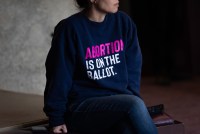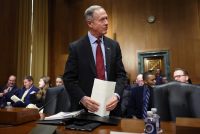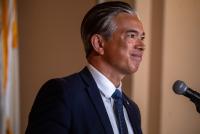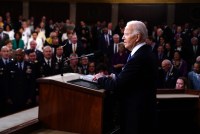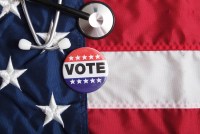Latest KFF Health News Stories
Adolescentes podrían ir al psicólogo sin tener el permiso de sus padres
Según la nueva ley en California, los jóvenes podrán hablar con un terapeuta sobre la identidad de género sin el consentimiento de sus padres. Pero no podrán recibir tratamiento residencial, medicación o cirugía de afirmación de género sin el visto bueno de sus padres, como han sugerido algunos opositores.
This State Isn’t Waiting for Biden To Negotiate Drug Prices
As the federal government negotiates with drugmakers to lower the price of 10 expensive drugs for Medicare patients, impatient legislators in some states are trying to go even further. Leading the pack is Colorado, where a new Prescription Drug Affordability Review Board is set to recommend an “upper payment limit” for drugs it deems unaffordable. In late […]
Move to Protect California’s Indoor Workers From Heat Upended by Cost Questions
A years-long process that would have created heat standards for California workers in warehouses, steamy kitchens, and other indoor job sites catapulted into chaos Thursday when Gov. Gavin Newsom’s administration pulled its support. Regulators, saying they felt “blindsided,” approved the regulation anyway. It’s unclear what happens next.
La nueva ola de propuestas estatales, impulsada por familias que perdieron familiares después de enfrentamientos con la policía, marca un paso importante para desterrar un término que los críticos dicen que incita a la policía a usar fuerza letal en exceso.
As money flows to abortion rights initiatives in states, some donors focus on where anger over the “Dobbs” ruling could propel voter turnout and spur Democratic victories up and down the ballot, including in key Senate races and the White House.
As More States Target Disavowed ‘Excited Delirium’ Diagnosis, Police Groups Push Back
After California passed the first law in the nation to limit the disavowed term “excited delirium,” bills in other states are being introduced to help end use of the diagnosis. But momentum is being met with resistance from law enforcement and first responder groups, who cite free speech.
A New Orleans Neighborhood Confronts the Racist Legacy of a Toxic Stretch of Highway
New federal funds aim to address an array of problems created by highway construction in minority neighborhoods. These are economic, social, and, perhaps above all, public health problems. In New Orleans’ Treme neighborhood, competing plans for how to deal with harm done by the Claiborne Expressway reveal the challenge of how to mitigate them meaningfully.
Exclusive: Social Security Chief Vows to Fix ‘Cruel-Hearted’ Overpayment Clawbacks
New Social Security Commissioner Martin O’Malley is promising to change how the agency reclaims billions of dollars it wrongly pays to beneficiaries, saying the existing process is “cruel-hearted and mindless.”
Secret Contract Aims to Upend Landmark California Prison Litigation
California has commissioned an exhaustive study of whether its prisons provide a constitutional level of mental health care, which it could use to try to end one of the lawsuits that have federal courts overseeing the state’s prisons. But corrections officials won’t disclose even basic details of the consultants’ contract, including its cost to taxpayers.
Tal vez tu crédito ya no se destruya por una cuenta médica impaga
Rob Bonta, fiscal general de California, anunció que está apoyando una legislación para impedir que la deuda médica aparezca en los informes de crédito del consumidor.
California Attorney General Boosts Bill Banning Medical Debt From Credit Reports
California Attorney General Rob Bonta has thrown his weight behind state Sen. Monique Limón’s legislation to bar unpaid medical bills from showing up on consumer credit reports. If passed, California would join just a few other states with such protections.
Biden Said State of the Union Is Strong and Made Clear His Campaign Is Off and Running
President Joe Biden used his roughly 68-minute address to Congress to counter lackluster public approval ratings and draw clear contrasts between his administration’s policies and those of Donald Trump and some congressional Republicans. Abortion and health care were in the spotlight.
What the Health? From KFF Health News: The State of the Union Is … Busy
At last, Congress is getting half of its annual spending bills across the finish line, albeit five months after the start of the fiscal year. Meanwhile, President Joe Biden delivers his annual State of the Union address, an over-the-counter birth control pill is (finally) available, and controversy erupts over new public health guidelines for covid-19 isolation. Alice Miranda Ollstein of Politico, Sarah Karlin-Smith of the Pink Sheet, and Sandhya Raman of CQ Roll Call join KFF Health News’ Julie Rovner to discuss these issues and more. Also this week, Rovner interviews Neera Tanden, the White House domestic policy adviser, about Biden’s health agenda. Plus, for “extra credit,” the panelists suggest health policy stories they read this week that they think you should read, too.
When It Comes to Ketamine, Meta’s Posting Policy Is No Party to Decipher
Despite growing awareness that the party drug is dangerous, the social media company is open to promotion of the drug in treating mental health.
Why Even Public Health Experts Have Limited Insight Into Stopping Gun Violence in America
After the 1996 Dickey Amendment halted federal spending on research into firearms risks, a small group of academics pressed on, with little money or political support, to document the nation’s growing gun violence problem and start to understand what can be done to curb the public health crisis.
Why Hospitals in Many States With Legal Abortion May Refuse To Perform Them
Many states that tout themselves as protectors of reproductive health care, including California, Michigan and Pennsylvania, have little-noticed laws on the books protecting hospitals that refuse to provide it. The laws shield at least some hospitals from liability for not providing care they object to on religious grounds, leaving little recourse for patients. The providers — many of them […]
Biden’s Got a Taker for One of His Gun Safety Proposals: California
California could give President Biden a political win this year on gun violence. State senators passed sweeping legislation in January that would toughen gun storage requirements, embracing a White House priority that has languished in Congress. Many states, including California, have laws in place requiring gun owners to securely store their firearms when children are […]
America Worries About Health Costs — And Voters Want to Hear From Biden and Republicans
The presidential election is likely to turn on the simple question of whether Americans want Donald Trump back in the White House. But health care tops the list of household financial worries for adults from both parties.
Los amigos de un joven muerto por envenenamiento por fentanilo impulsan una ley estatal para que estudiantes de secundaria puedan llevar Narcan en sus mochilas sin riesgo de ser castigados.
Avanzan en varios estados proyectos de ley extremos sobre el uso de baños por género
Al menos uno de los proyectos de ley es tan extremo como para proponer que se considere delito que una persona transgénero entre en una instalación que no coincida con el sexo indicado en su acta de nacimiento.







